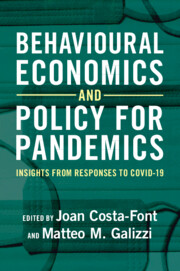Book contents
- Behavioural Economics and Policy for Pandemics
- Behavioural Economics and Policy for Pandemics
- Copyright page
- Epigraph
- Contents
- Contributors
- Preface
- Acknowledgements
- 1 Behavioural Economics and Policy for Pandemics
- Part I Evidence from Experiments and Behavioural Insights
- Part II Health Behaviours and Policies during Covid-19
- 14 The Effect of COVID-19 on Health and Health Behaviours
- 15 Mental Health and Health Behaviours among Vulnerable Populations during the COVID-19 Pandemic in the United States
- 16 Mental Health Interventions during the COVID-19 Pandemic
- 17 Wrinkles in a Pandemic?
- 18 Can Behavioural Insights Explain Ethnic Minority Vaccination Gaps?
- 19 How Can We Optimise Healthcare Delivery in the Wake of the COVID-19 Pandemic?
- 20 Biases in Vaccine Authorisation
- 21 Trust and the COVID-19 Pandemic
- 22 How Do Individuals Perceive the Risk of COVID-19 Compared to Food Poisoning and Influenza?
- Index
- References
16 - Mental Health Interventions during the COVID-19 Pandemic
The ‘Welcomed Lockdown’ Hypothesis
from Part II - Health Behaviours and Policies during Covid-19
Published online by Cambridge University Press: 31 January 2025
- Behavioural Economics and Policy for Pandemics
- Behavioural Economics and Policy for Pandemics
- Copyright page
- Epigraph
- Contents
- Contributors
- Preface
- Acknowledgements
- 1 Behavioural Economics and Policy for Pandemics
- Part I Evidence from Experiments and Behavioural Insights
- Part II Health Behaviours and Policies during Covid-19
- 14 The Effect of COVID-19 on Health and Health Behaviours
- 15 Mental Health and Health Behaviours among Vulnerable Populations during the COVID-19 Pandemic in the United States
- 16 Mental Health Interventions during the COVID-19 Pandemic
- 17 Wrinkles in a Pandemic?
- 18 Can Behavioural Insights Explain Ethnic Minority Vaccination Gaps?
- 19 How Can We Optimise Healthcare Delivery in the Wake of the COVID-19 Pandemic?
- 20 Biases in Vaccine Authorisation
- 21 Trust and the COVID-19 Pandemic
- 22 How Do Individuals Perceive the Risk of COVID-19 Compared to Food Poisoning and Influenza?
- Index
- References
Summary
This chapter discusses the ‘welcomed lockdown’ hypothesis, namely the extent to which there is a level of risk where mobility restrictions do not reduce well-being. That is, we examine the well-being effects of mobility restrictions resulting from COVID-19, controlling for risk exposure (proxied by COVID-19 fatality rate). We suggest that in an environment of high mortality, lockdowns no longer give rise to a reduction in well-being, consistent with the ‘welcome lockdown’ hypothesis. The evidence we show in this chapter suggests that whilst a ‘preventive’ lockdown in a low/moderate mortality environment increases symptoms of depression and anxiety, in a high mortality setting (such as those in many countries during the first wave of COVID-19) it mitigates such negative effects, particularly on anxiety.
Keywords
- Type
- Chapter
- Information
- Behavioural Economics and Policy for PandemicsInsights from Responses to COVID-19, pp. 309 - 324Publisher: Cambridge University PressPrint publication year: 2024

